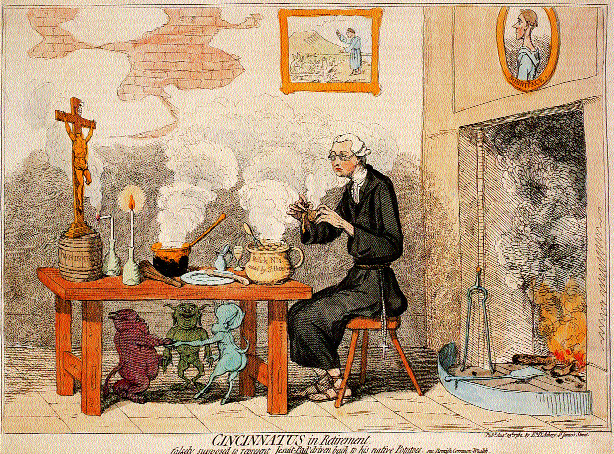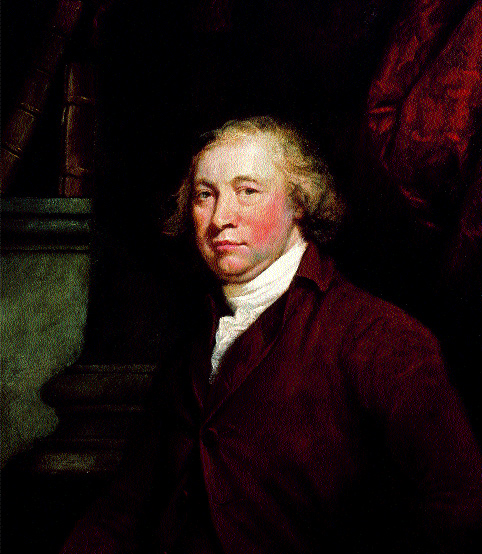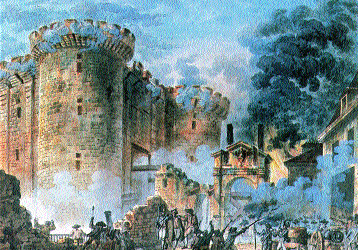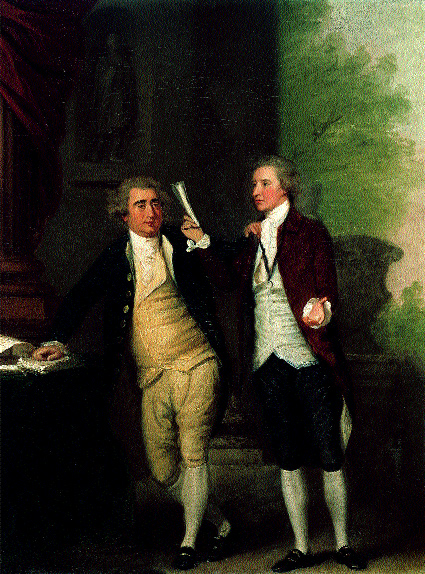Edmund Burke: scorned loyalty and rejected allegiance
Published in 18th–19th - Century History, Features, Issue 2 (Summer 2004), Volume 12
James Gillray’s Cincinnatus in Retirement, 23 August 1782, is typical of caricatures of Burke, combining his Irish background (symbolised by the steaming potato he fastidiously peels) with his alleged secret Catholic faith (hence the chamberpot, ‘Relick No.1 used by St Peter’). (British Museum)
An eighteenth-century Whig dressed in ill-fitting nineteenth-century Tory clothing?
Seán Patrick Donlan assesses the hotly contested legacy of Edmund Burke
For two centuries the legacy of Edmund Burke has been hotly contested and arguably distorted by apologists and opponents alike. In his day, the London press caricatured him as a whiskey-toting Jesuit, managing to combine his Irish background and ever-present rumours of a secret Catholic faith. Many modern commentators do as little justice to him, dressing the Whig Burke in ill-fitting nineteenth-century Tory clothing. In Ireland, when he is not simply forgotten, his status as an Irish Protestant and British statesman ensures that Burke continues to be associated with the Ascendancy he so fiercely criticised. By exemplifying the complexities of eighteenth-century British culture and Irish society, his career is perfectly suited to challenge narrowly ‘nationalistic’ visions of Irish identity. Until late in the century, Irish ‘patriotism’ and demands for legislative independence were largely Ascendancy affairs. Given the monopoly that this ‘junta’ enjoyed over Irish life, Burke believed that the British parliament was the only site from which Irish reforms could be effectively enacted. Ultimately he sought a union of sentiment and affection, if not necessarily politics, between the two nations.
Family background
Many of the details of Burke’s life remain unclear. He was born in January of 1729 or 1730, probably in Dublin. The family home was on the frequently flooded Arran Quay, near the site of the current Four Courts. His father, apparently from the west of the country, was an attorney with the Irish court of the exchequer. The senior Burke appears to have converted to the established church in the decade before Edmund’s birth. Given the Penal Laws, relaxed at the time but far from redundant, he would not otherwise have been allowed to practice. Burke’s mother, a Nagle, remained a Catholic and raised her surviving daughter in that faith. Of the Burke children, only three of thirteen lived to adulthood. The young Ned was sickly, too, and was sent to live with maternal relatives in the Blackwater Valley of rural Cork. It seems reasonable to assume that he obtained his early education there, quite possibly in Irish. But Ned’s instruction would have gone far beyond the school curriculum. The Nagles remained one of the few remaining Catholic families of property in the area. With his subsequent study at a Quaker preparatory school in Kildare and at Trinity College, he was well schooled in the confessional intricacies of Irish life.
The broadly humanist focus of Burke’s Trinity education was deepened with his activities beyond the lecture hall. Most notably, he helped to establish the Trinity ‘Club’, the first such debating society in Britain or Ireland and the forerunner of the modern Historical Society. This is also the first evidence of his many links to the ‘polite’ culture of civility, tolerance and the ‘rule of law’ that was to be so important to eighteenth-century British thought. Joseph Addison, Anthony Ashley Cooper (the earl of Shaftesbury) and the Revd Joseph Butler were all formative influences. Closer to home, Burke was also aware of the work of Jonathan Swift, James Arbuckle and Francis Hutchinson, the Scoti-hiberni ‘father of the Scottish enlightenment’. While these were important to the thought of the mature Burke, he soon showed an awareness of the limits of politeness, the absence of tolerance and the potential perversions of law.
Wandering the coffeehouses of Temple Bar
This is first evident in Burke’s involvement with The Reformer, a successful but short-lived Dublin periodical. Started at the end of his studies at Trinity, Burke was its driving force. In the mode of Addison, the journal was initially dedicated to the city’s theatre, in the belief that aesthetics and ethics, manners and mores, were closely related. Among other things, it finds the young Burke wandering the coffeehouses of Temple Bar to gauge public opinion. As the title indicates, however, he was already reluctant to remain a spectator in public affairs. Critical of English condescension towards Ireland, its issues also paint a stark portrait of Irish poverty. The Irish gentry are chastised for failing to act with ‘publick spirit’ for the ‘improvement’, ‘uniform Plenty’ and happiness of the country. In The Reformer and the Trinity ‘Club’, Burke tackled questions of Irish trade, landlord absenteeism and the contemporary Jacobite rising. A promised second series of the journal never materialised. This may have owed less to Burke or the popularity of The Reformer than to his father’s impatience with any delay in his legal education.
From 1750 Burke studied law at London’s Middle Temple, where up to a third of the students were Irish. English legal education of the age was notoriously illiberal, however, amounting to little more than attendance in the courts of Westminster and dining with practising attorneys. Burke, who had not yet given up his literary pretensions, quickly came to share these views. While it is clear in his subsequent career that he developed a deep knowledge of and affection for jurisprudence, Burke left the Inn without being called to the bar. The little information that survives about his next few years shows him to be actively engaged in a writing career. His first publication, A vindication of natural society, appeared in 1756. A parody of the religious deist and ‘country’ Tory Lord Bolingbroke, it managed to combine literary ambitions with philosophical and political ‘savvy’. It also reveals with particular force the difficulty involved in reading and interpreting Burkean rhetoric. His first major work, A philosophical inquiry into the origins of our ideas of the sublime and the beautiful, followed the next year. Begun at Trinity, Burke presents in it an empiricist psychology in which sentiment and ‘sympathy’, as much as reason, were vital elements of human nature and association. In line with contemporary science, he emphasises a belief in a generally common nature deeply influenced by culture and historical circumstance.
Around the same time, Burke collaborated with his ‘cousin’ and Middle Temple fellow William Burke on An account of the European settlements in America (1757). While his precise role remains unclear, it was the first of several aborted, but extensive, forays into history. Shortly afterwards, he began and partially completed An abridgement of the English history (1757–62?) through to the Magna Carta. In it, the early Saxons gradually progressed and were civilised by their ‘communication’ with the Continent. Similarly, in a related fragment on English law, Burke criticised the crude insularity of English jurisprudence and historiography. Like the Enquiry, these histories also remain naturalistic. The ideas for which he is best known—prescription, property, inheritance, etc.—are seen to develop on the basis of natural presumptions and social practices over time. Precisely because it was a communal, cumulative development, cultural progress was the fruit of a long, slow process that was by no means assured. And if Ireland had not saved civilisation, it had played its part. Even conquest could be a source of civilisation, as it had in England, though the experiences of Ireland, and later India, would make clear how colonialism could corrupt colonisers and colonised alike.
Acquainted with the leading thinkers of the day

Edmund Burke, Statesman, Orator, Writer (1729–97) by James Barry. (National Gallery of Ireland)
In the late 1750s Burke began to act as editor of the Annual Register, a collection of original articles, extracts, reviews and reports of contemporary affairs. It further extended his knowledge of European political, historical and philosophical works. By the end of the decade he had also become acquainted with many of the leading thinkers and artists of the day. Gaining admission to Samuel Johnson’s circle, Burke soon found himself alongside James Boswell, Joshua Reynolds, David Garrick and fellow countryman Oliver Goldsmith. He also began friendships with David Hume and Adam Smith, the first of many important personal relationships with members of the so-called ‘Scottish enlightenment’. Even with these literary and social activities, Burke was plagued, as he was throughout his life, by financial difficulties. His marriage to Jane Nugent, daughter of an Irish émigré to England and child of a mixed Catholic–Presbyterian marriage, made such problems more pressing. The birth of two sons, one of whom died in early childhood, made these practical concerns more urgent still.
In attempting to meet his financial responsibilities, Burke took his first step towards a political career. He accepted a position as personal secretary to William Hamilton on condition that he could continue his writing career. Soon after, Hamilton was made Irish chief secretary, and Burke was set to return to Ireland. It was not to prove an entirely happy homecoming.

The Taking of the Bastille, 14 July 1789 by Jean-Pierre Houel- Burke maintained that, in threatening the corporate, slow and fragile development of manners over the centuries, the French Revolution was deeply regressive. (Musée Carnavalet, Paris)
With his arrival in Dublin imminent, he sought a reconciliation with his father by post, but the elder Burke died before his arrival. Throughout the 1760s Burke was repeatedly drawn into controversies in which members of his extended Catholic family were implicated. Most important was his involvement in the furore surrounding the ‘Whiteboy’ disturbances in rural Munster. These agrarian activities, extending to the Blackwater Valley, quickly became charged with sectarian overtones. Burke actively sought to mollify the harsh reaction of the Dublin government and worked especially closely with the men chosen to report on the events to Hamilton. These events were critical to Burke’s interpretation of Irish affairs for the next 30 years.
During these years Burke wrote or began numerous pieces on Ireland. Among these was an account of Dublin’s overreaction to the Whiteboy activities. He ended the work only when a friend, the polemicist-historian Dr John Curry, began a similar project. Though unpublished, various versions of Tracts on the popery laws (1764) continued to circulate among the more progressive elements of Irish and British opinion. His Address and petition to the King (1764), written on behalf of Irish Catholics and shared with Curry, later served as the basis for a similar work of the Catholic Committee. Each reflects Burke’s legal training, his historical erudition and an increasing maturation as a writer. The situation in Ireland also seems to provide a lens through which he would view later events. The experience of the dispersal and destruction of a traditional aristocracy, of confiscations and property division based on cultural and religious status was a pattern he would see repeated in British India and in the revolution in France. Such abuse, particularly by means of the law, struck Burke as especially perverse. The Penal Laws were not merely harmful to individuals as individuals but destroyed families, perverted communal bonds, and made the improvement and inheritance of property extraordinarily difficult.
Wanted an ‘interior’ history of Ireland
In these works and in private correspondence Burke was deeply critical of contemporary histories of Ireland. He saw these as both inaccurate and dehumanising portrayals of the native Irish, feeding continuing sectarian divisions. He and the Scottish historian and philosopher David Hume were to argue bitterly over the Scot’s portrayal of the Irish rebellion of 1641 as a ‘massacre’ on the part of the Irish Catholics. With disappointing results, Burke encouraged a number of Irish historians—Curry, Charles O’Conor and Thomas Leland—to communicate a truer, ‘interior’ history of Ireland. He contributed materials to their work as well, and arranged for documents to be donated to Trinity. It is even possible that Burke briefly considered writing his own Irish history, especially on the years leading up to 1641. He remained an authority in the eyes of his contemporaries. Curry, for example, thought Burke competent enough to give him a free hand in making corrections to his text. As late as the 1790s, debating historians Thomas Campbell and Colonel Charles Vallancey continued to drag him into continuing Irish historiographical controversies.
Burke eventually fell out with Hamilton over increasing demands on his time. While this must have concerned him, it would prove fortuitous. Within two years Burke was working as personal secretary for Charles Watson-Wentworth, Lord Rockingham, an important Whig leader and only recently British prime minister. Shortly afterwards, he entered parliament himself. This largely ended the possibility of a literary career but afforded Burke the opportunity of acting as a ‘philosopher in action’. Given the Ascendancy’s dominance over the Irish parliament, it was also the best place from which to exert pressure for Irish reforms. In working to establish Irish free trade, Burke hoped to dismantle both the economic monopoly of Britain over Ireland and perhaps the wider monopoly of the Ascendancy within Ireland.
Opposition to the American war

Edmund Burke in conversation with his friend, Charles James Fox by Thomas Hickey. By the mid-1790s Burke and 40 other MPs had split from Fox and the radical Whigs to form an independent parliamentary grouping. (National Gallery of Ireland)
As a British ‘senator’, Burke sought numerous other changes. He unsuccessfully proposed economic reforms designed to eliminate the vestiges of feudalism and to reduce crown influence. He championed religious tolerance, argued against slavery, and was critical of many of the more draconian aspects of contemporary criminal law, especially capital punishment and transportation. With the Rockingham Whigs, he supported the election of John Wilkes against the government’s repeated attempts to prevent him from entering parliament. Burke’s best-known opinion at this stage of his career was his strong opposition to the American war. It was in his numerous American writings and speeches that he first articulated his disgust with abstract declarations of rights. As with Ireland, what was essential was not such rights or the maintenance of existing political connections between Britain and its colonies but ties of affection and mutual interest.
For nearly twenty years Burke was also the chief ideological spokesman of the Rockingham Whigs, effectively maintaining a tension deriving from earlier ‘country’ and ‘court’ political traditions. The commercial humanism they sought to maintain was a serious attempt at combining public honour and private interest, balancing the stability and corporate experience of a hereditary aristocracy with the energy and ambition of a ‘natural’ aristocracy.
They were especially critical of crown influence and remained anxious, with their Whig predecessors, about colonialism and standing armies. Burke’s Thoughts on the cause of the present discontents (1770), for example, remains an important distinction between political parties based in publicly expressed principles and factions rooted in interest. In other writings and speeches he defended the independence of members of parliament from the instructions of electors. He had to. The merchants of Burke’s Bristol constituency opposed his views on Ireland, America, religion and slavery. Indeed, the reactionary nature of much contemporary populism, particularly the anti-Catholic riots in Scotland and England, is especially important in understanding his later responses to British radicalism and European revolution. At its best, Burke saw parliament as a body independent of the vagaries of public opinion and the influence of the crown. Unfortunately for Burke, while they played an important role in British politics, the Rockingham Whigs were to spend very little time in government.
His obsessive nature
The 1780s were a critical time for both Irish and British politics. In 1782, under the pressure of the American war, the Irish parliament had achieved (in theory at least) a measure of legislative independence. At the same time the Penal Laws were relaxed. The Whigs had played an important role in these events and many of Burke’s Irish associates viewed the changes with promise. He was surprisingly silent, perhaps preferring to wait for evidence of additional reforms. His notes from the time show him more clearly outraged at both the prospect of introducing foreign troops into Ireland and the creation of the Irish, overwhelmingly Protestant, Volunteers. Beyond Irish affairs, Burke also began the impeachment of Warren Hastings over his actions as governor-general of India. The fourteen-year impeachment clearly displayed his obsessive nature, but it also finds him arguing against the imposition of British laws and manners on India. Instead, he defends the native civilisations, their institutions and religious beliefs.
Rockingham’s death in the early 1780s exposed internal Whig divisions. Radical Whig elements became more vocal in their demands for constitutional innovations, particularly in representation. This corresponded with a brief, failed, coalition in government for the Rockingham Whigs. The coalition was a marriage of political convenience and reflected poorly on a party that had defended itself on its principles. The subsequent election of 1784 was a débâcle. British radicals, among whom religious dissenters were an important component, were critical to the party’s losses. Beyond noting these political differences, Burke also recognised deeper philosophical disagreements that would surface after the French revolution. His concerns were exacerbated during the regency crisis of 1788–9, brought on by the madness of King George. The resulting uncertainty about the succession only further exposed the widening divisions over issues of British constitutional theory and history.
Reflections on the revolution in France

James Gillray’s Smelling out a Rat;-or The Atheistical Revolutionist disturbed in his Midnight Calculations, 3 December 1790-a grotesque image of Burke, upholder of church and crown, confronts the dissenting preacher Richard Price as he composes a tract On the Benefits of Anarchy Regicide Atheism. (British Museum)
It is in this context that Burke’s response to events in France must be understood. As constitutional reform turned to cultural revolution, the novelty and proselytising spirit of the revolution became ever more apparent. Approached by Thomas Paine, soon to be his chief ideological enemy, Burke was taken aback by his enthusiasm for an expanding European revolution. More immediately, a published sermon of the dissenter Richard Price to English sympathisers of the revolution seemed to confirm a real threat to Britain. Reflections on the revolution in France and on the proceedings in certain societies in London relative to that event (1790), Burke’s most famous work, was largely aimed at this native audience. Paine and Price also validated his belief in important political and philosophical links between British religious radicalism and French revolutionary thought. Furthermore, Burke saw revolutionary zeal as little different from the religious enthusiasm of the British, Irish and European wars of the previous century. His response forced British Whigs to take sides. Before he finally left parliament in the mid-1790s, he and 40 other members split to form an independent parliamentary grouping.
The revolution and Burke’s response to it were, of course, complex acts. The high strain of his rhetoric cannot be denied, but it was rooted in a sophisticated empiricism and an extensive historical erudition, a conscious appeal to both reason and sentiment. His defence of chivalry, for example, was not a feudal throwback but signified the complex blend of those elements—political, religious, even martial—that had made European civilisation and enlightenment possible. As a term of art, ‘chivalry’ was part of the analysis of both Voltaire and the Scottish enlightenment. For Burke, radicalism seemed to neglect the role of time, of cultural history and individual experience.
Commerce and even the rule of law were ultimately dependent on the corporate, slow and fragile development of manners. In threatening the gains of centuries, the revolution was deeply regressive. For all the limits of his thought, the complex balances and counterbalances of modern culture and society—including their civil societies, market economies and limited states—owe as much to thinkers like Burke as to eighteenth-century revolutions.
Burke’s anti-revolutionary activities did not detract from a continuing preoccupation with Irish affairs. Whereas he saw the French revolution as the fruit of economic success, a ‘monied interest’ and a powerful intelligentsia, Irish discontent was instead based on long experience of colonial repression and social exclusion. Irish Jacobinism was rooted in ‘scorned loyalty, and rejected allegiance’, feelings that devolution to the Ascendancy master caste had only exacerbated. Throughout the 1790s Burke continued to press for the elimination of civil disabilities on Irish Catholics. His son Richard served, with little ability and less tact, as agent for the Irish Catholic Committee. Richard died in 1794 only ten days after taking his father’s parliamentary seat. Burkes’s own death followed shortly afterwards, a year before the rebellion of 1798. He would no doubt have regretted the rebellion, but would have easily understood its deeper roots. The practical effects of the Act of Union that resulted shortly afterwards, failing in its commitments to reform, would have been regarded by him as equally regrettable.
Burke was neither a revolutionary nor a reactionary. He was, for better or worse, a reformer. Understanding something of the complexity of his life and thought may clarify common misperceptions not only about him but also about eighteenth-century Ireland. Given Ascendancy dominance in Irish life, Burke believed the parliament in London to be more likely than that in Dublin to enact reforms for the great majority of his countrymen. Throughout his life he sought, as he had in debates on America and India, a union of interest and sentiment between Ireland and Britain, and indeed the rest of Europe. In so doing, he deserves greater recognition in modern Ireland. His loyalty remains too often scorned, his allegiance too often rejected.
Seán Patrick Donlan lectures at the University of Limerick.
Further reading:
M. Fuchs, Edmund Burke, Ireland, and the fashioning of self (Oxford, 1996).
L. Gibbons, Edmund Burke and Ireland: aesthetics, politics, and the colonial sublime (Notre Dame, 2003).
C.C. O’Brien, The Great Melody: a thematic biography and commented anthology of Edmund Burke (London, 1992).
W. O’Brien, Edmund Burke as an Irishman (Dublin, 1926).
















